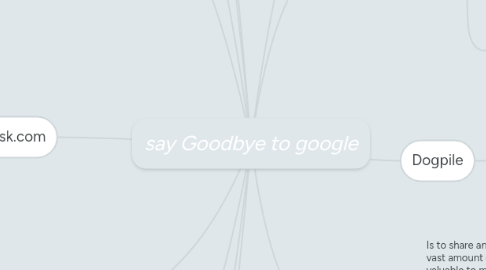say Goodbye to google
作者:Lyzkie Daylabo

1. Vimeo
1.1. a video sharing platform that was launched in 2004 by a group of filmmakers. Since then, the platform has grown to over 14 million members – most of them artists in film, animation, music and other works of art – who’ve been able to use Vimeo as a way to share and promote their work.
2. Yandex
2.1. Is a Russian multinational technology company specializing in Internet-related services and products. Yandex operates the largest search engine in Russia with about 60% market share in that country. It also develops a number of Internet-based services and products. Yandex ranked as the 4th largest search engine worldwide, based on information from Comscore.com, with more than 150 million searches per day as of April 2012, and more than 50.5 million visitors (all company's services) daily as of February 2013.[The company's mission is to provide answers to any questions users have or think about (explicit or implicit). Yandex also has a very large presence in Ukraine and Kazakhstan, providing nearly a third of all search results in those markets and 43% of all search results in Belarus.
3. Broadreader
3.1. Is an application that aggregates data from multiple social media sources across the Internet. The BoardReader crawler connects to the BoardReader server to collect this data so that it can be indexed, searched, and analyzed by Watson Content Analytics.
4. Ixquick
4.1. a search engine that you open in a web browser, such as Internet Explorer, Firefox, or Safari. Your web browser can take you any place on the Internet you want to go; Ixquick is just one such web page you can visit.
5. ask.com
5.1. is a question answering-focused e-business and web search engine founded in 1996 by Garrett Gruener and David Warthen in Berkeley, California. The original software was implemented by Gary Chevsky from his own design. Warthen, Chevsky, Justin Grant, and others built the early AskJeeves.com website around that core engine. In late 2010, facing insurmountable competition from more popular search engines, the company outsourced its web search technology and returned to its roots as a question and answer site.[2] Douglas Leeds was elevated from president to CEO in 2010.[3]
6. SlideShare
6.1. a slide hosting service, acquired by LinkedIn in 2012. It allows users to upload files (PowerPoint, PDF, Keynote, or OpenDocument presentations) either privately or publicly. The slide decks can then be viewed on the site itself or can be embedded on other sites.
7. Addict-O-Matic
7.1. This tool is a free site that exists in order to provide the users with a dashboard made up of a variety of sources with related links on a specific topic of their choice. It is a means to gather information from different sources and aggregate them all onto one homepage(your dashboard) while being separated by sources. Each source, for example: Bing news, will have a box and within the box it will provide you with links related to your search query. It is a clean and manageable way to organize the information you need.
8. Creative Commons Search
8.1. org will help you find photos, music, text, books, educational material, and more that is free to share or build upon utilizing Creative Commons enabled search services at Google and Flickr. You can also access this tool via the Firefox web browser
9. giphy
9.1. is a new GIF search engine founded by Alex Chung and Jace Cooke. ... Its stylish, stripped-down interface allows users to search for reaction GIFs using tags like "sad" and "bored" in a large search bar on the top of its homepage.
10. Bing
10.1. A search engine created and operated by Microsoft, replacing its former Live Search, Windows Live Search, and MSN Search offerings.Microsoft CEO Steve Ballmer revealed the search engine in May 2009. Bing was fully operational in June 2009.
11. Duckduck Go
11.1. Is an Internet search engine that emphasizes protecting searchers' privacy and avoiding the filter bubble of personalized search results.[2] DuckDuckGo distinguishes itself from other search engines by not profiling its users and by deliberately showing all users the same search results for a given search term.[4] DuckDuckGo emphasizes getting information from the best sources rather than the most sources, generating its search results from key crowdsourced sites such as Wikipedia and from partnerships with other search engines like Yandex, Yahoo!, Bing, and Yummly.
12. Quora
12.1. Is to share and grow the world’s knowledge. A vast amount of the knowledge that would be valuable to many people is currently only available to a few — either locked in people’s heads, or only accessible to select groups. We want to connect the people who have knowledge to the people who need it, to bring together people with different perspectives so they can understand each other better, and to empower everyone to share their knowledge for the benefit of the rest of the world.
13. Dogpile
13.1. A metasearch engine for information on the World Wide Web that fetches results from Google, Yahoo! and Yandex, and includes results from several other popular search engines, including those from audio and video content providers. It is a registered trademark of Blucora, Inc.


